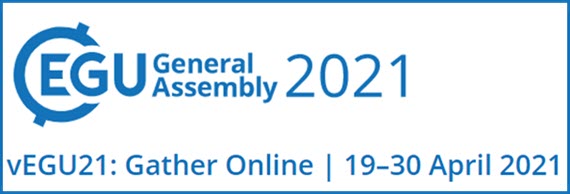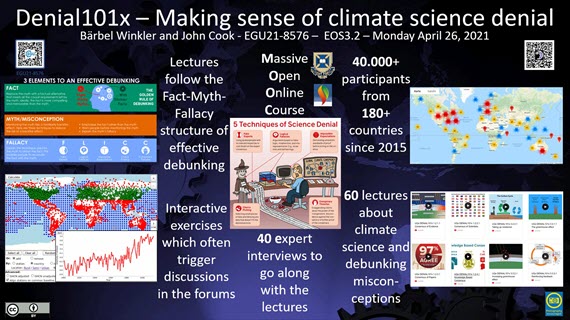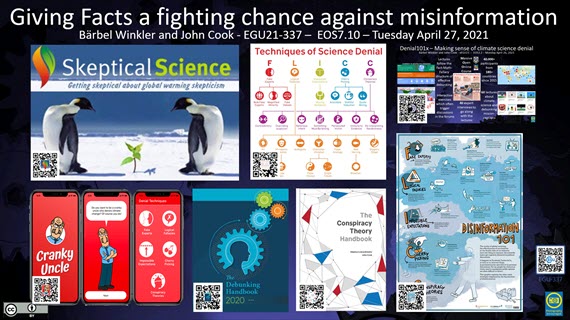vEGU21 - Gather online - Prolog
Posted on 15 April 2021 by BaerbelW
Just like last year, this year's General Assembly of the European Geosciences Union (EGU) will happen virtually instead of in person in Vienna. Contrary to last year, the organizers decided early on to hold their conference online and planned for it accordingly (quite a difference to last year's scramble where they switched from an on-premise to an all-online conference within just about six or seven weeks!).
As a consequence, this year's "vEGU21: Gather Online", will not be free of charge as it was last year and conference activities will only be available for registered participants from now until May 31. Afterwards, any presentations uploaded under a creative commons license to the website will become open access and will be available on EGUSphere.
vPICO session format
All scientific sessions at vEGU21 will be run in the new virtual PICO (vPICO) format where each 1.5-hour-long vPICO session will feature approximately 20 abstracts and be divided into two parts: an overview and chats. Each session will have an introductory round of live 2-minute talks (each based on a single slide) which will be presented in a central video chat moderated by the session conveners. After all 2-minute talks of a time block have been finished, each presentation will have its own live text chat, where participants can post questions to the abstract authors to stimulate further discussion.
I'll know pretty soon how well this will work as John Cook and I have abstracts in two sessions, one each on Monday (in EOS3.2) and Tuesday afternoon (in EOS7.10) which I'll be presenting. EGU does have a "one abstract per presenting author rule" but our abstracts are both in Education and Outreach sessions (EOS) where two abstracts are luckily allowed. Which is why we were able to submit abstracts to two different sessions.
Session EOS3.2 - Climate Literacy: Learning, education, methods and roadmaps
Session EOS3.2 is convened by David Crookall, Giuseppe Di Capua, Lydie Lescarmontier, Robin Matthews, and Frank Niepold. Their session's focus is on aspects of climate literacy – on learning processes, instructional materials, learning methods and experiences, and curricular innovation to promote greater climate literacy (CL). The full spectrum of climate change (CC) science that might be covered by CL will be included, such as GHGs, reinforcing feedback, energy systems, heatwaves, sea-level rise, oceans, carbon cycle, ice melt, communication, attitudes, gender issues, health, political influence, activism, behavioural change and geoethics. The session is an opportunity for people (ECSs, scientists, educators, policy influencers, learning resource developers and other experts) to share their experience, expertise and research on effective ways of improving CL, to better fight CC.
This looked like a good fit to talk about our MOOC Denial101x again with a slightly updated presentation compared to 2019 to fit the new vPICO-format with a short "elevator pitch" and a long-form display available with the abstract to conference attendees. Here is the summary slide I'll use during the elevator pitch:
Abstract EGU-8576 - Using an interdisciplinary MOOC to teach climate science and science communication to a global classroom - full presentation (7MB)
Session EOS7.10 - Science to Action: Communication of Science and strategies to fight misinformation - Practice, Research and Reflection
Session EOS7.10 is convened by Sam Illingworth, Heidi Roop, Mathew Stiller-Reeve, Kristin Trimm, Laure Fallou, Irina Dallo, Michèle Marti, and Femke Mulder. This session, run at both AGU and EGU, encourages critical reflection on science communication best practices and provides an opportunity for the community of science communicators and researchers to share best practices and experiences with evaluation and research in this field. The session will also explore the way efficient communication strategies can help prevent, fight and debunk misinformation. Case studies, comparisons between different hazards and risks as well as best practices to fight misinformation at all stages of the risk cycle will be explored.
For this session I created a new presentation, roughly based on my blog post "Resources to give facts a fighting chance against misinformation" but restricted to resources with direct involvement from SkS team members. Skeptical Science, FLICC, Denial101x, The Debunking Handbook, The Conspiracy Theory Handbook and Cranky Uncle all make an appearance in the slide-deck as well as this summary slide:
Abstract EGU-337 - Giving facts a fighting chance against misinformation - full presentation (PDF 2.6MB)
It will be interesting to see what all vEGU21 will have in store for participants. Their video "Welcome to the Virtual Conference Center" does already look promising! I plan to write about my experiences again this year, just as I did in previous years. So be on the lookout for additional blog posts in the last week of April when most of the conference will take place.































 Arguments
Arguments

































Comments